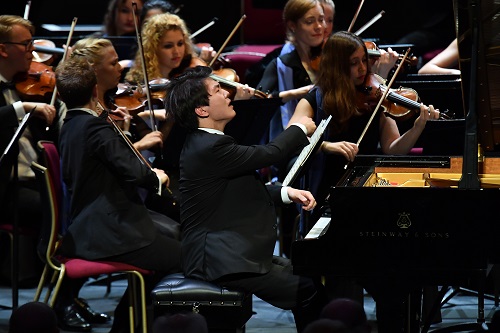
 United Kingdom BBC PROM 49 – Zubel, Chopin, Tchaikovsky: Seong-Jin Cho (piano), European Union Youth Orchestra / Gianandrea Noseda (conductor). Royal Albert Hall, London, 19.8.2018. (CC)
United Kingdom BBC PROM 49 – Zubel, Chopin, Tchaikovsky: Seong-Jin Cho (piano), European Union Youth Orchestra / Gianandrea Noseda (conductor). Royal Albert Hall, London, 19.8.2018. (CC)

(c) BBC/Chris Christodoulou
Agata Zubel – Fireworks (UK premiere)
Chopin – Piano Concerto No.2 in F minor Op.21
Tchaikovsky – Symphony No.5 in E minor Op.64
It was wonderful to see and hear the European Union Youth Orchestra, founded 42 years ago, in all its glory. This was a bit of a homecoming for the orchestra, whose offices were based in London pre-Brexit but are now relocated within Europe itself. The plethora of European flags at the back of the stage underlined the multinational aspect of the orchestra; and only served as a reminder of the isolationism that is to come for the UK in the forthcoming years.
Polish composer and singer Agata Zubel (born Wroclaw, 1978) is known as an advocate of the avant-garde. Her piece Not I (2010) has been recorded by contemporary music specialists Klangforum Wien for the Kairos label while as a soprano she has recorded Lutosławski and André Tchaikovsky for CD Accord; yet her discography remains surprisingly small. The present piece, Fireworks, dates from 2018. It was written to mark the centenary of Poland’s independence (November 1918) and was premiered a mere six days before this concert. It is written for huge orchestra (as an indication, 12 double basses arranged up the side of the stage, with all the brass except the horns behind and above them; six percussionists).
Despite the centenary tribute, the composer asks that the listener not fixate on any ‘painful residue of Romanticism’ in her lyrical aspect, nor that the listener take the brass and percussion ‘interventions’ as echoes of an earlier time. The composer claims that all she wanted to do was to exclaim: ‘I am happy to be alive and free, here and now!’. The problem is that the ‘now’ she refers to appears to be somewhere around the early to mid-1980s. The catalogue of gestures on display all spoke of an earlier time, from the wha-wha mutes on the trumpets after a low grumbling from the orchestra onwards. No doubt Zubel would hate me pointing out jazz references as well. The scoring, too, was a tad suspect: one could see the strings performing glissandos as if their lives depended on it, but (at least from the stalls) they were all but inaudible. The accuracy and the concentration were remarkable, the players performing as if this was their daily bread and butter, but for all of its brevity (less than ten minutes), these fireworks still managed to outstay their welcome.
Berlin-based Korean pianist Seong-Jin Cho, winner of the 2015 Chopin Competition at the age of 21 (and that competition’s first South Korean winner) has released some notable Chopin recordings for DG: the Préludes and the Second Sonata, a somewhat variable release that reveals some immaturities, and a First Concerto (with the Ballades) that is far more consistent and impressive. On that concerto recording he is accompanied by the LSO and Noseda, the conductor here. The pairing of Cho and Noseda is, in fact, a match made in heaven. Noseda is a supreme accompanist, and was faultless in this account of the Second Concerto. Orchestral textures were brilliantly delineated (double-basses halved to a mere six); and the underlining of the trombone’s contribution was noteworthy. Cho was in superb form, his filigree a continuous source of delight. Inner lines on the piano, too, sang, but there was never any suspicion of point-making.
The disciplined opening of the central Larghetto was reflected in the pristine delivery of Cho; when the two came together as pizzicato double-basses provided a beating heart for the piano’s ‘recitatives’, there really was the feeling of the perfect partnership. A special mention is due for Luka Mitev’s bassoon solo here (and indeed the bassoon contribution throughout). The finale’s dynamism was carefully balanced by that attention to detail, the orchestra superbly involved throughout. An encore was required, and delivered: the Polonaise in A flat, Op. 53/B147 in a brilliantly wide-ranging performance.
A warhorse such as Tchaikovsky’s Fifth needs the freshness of youth, and the European Union players brought a glorious sense of discovery to this reading. There was an unutterable tenderness as well as beauty of tone to Gerbrich Francine Meijer’s clarinet opening to the first movement, performed as if she carried the weight of the world on her shoulders. The discipline instilled by Noseda shone in the perfectly graded tutti hairpins; the first movement had a most convincing narrative. Blissfully, there was no break between the first and second movements (after the first movement of the Chopin there was almost silence before a smattering of applause broke out). Hanna Guirten was the superb horn player essaying the famous solo at the start of the second movement; the delicate oboe of Jesús Pinillos Rivera later embellished the string reprise of the theme beautifully.
Again, there was no break before the third movement Valse. Eloquent beyond their years, this was a suave performance with violins perfectly together. A lovely sense of rightness pervaded. The Finale worked through Noseda’s carefully considered tempi, generating long-term excitement through passages of the utmost nobility before the brass revelled in their own virtuosity at the end. A magnificent performance, technically as near as perfect as one could hope to ask for.
An encore, the ‘Hungarian March’ from Berlioz’s Damnation de Faust. The musical youth of today as evidenced here in the EUYO, with such a wonderful sense of diversity amongst unity, gives us all hope.
Colin Clarke
Wonderful summing up of a superb concert. As a regular Prom attender, it was quite outstanding, one of the best Proms I have attended.